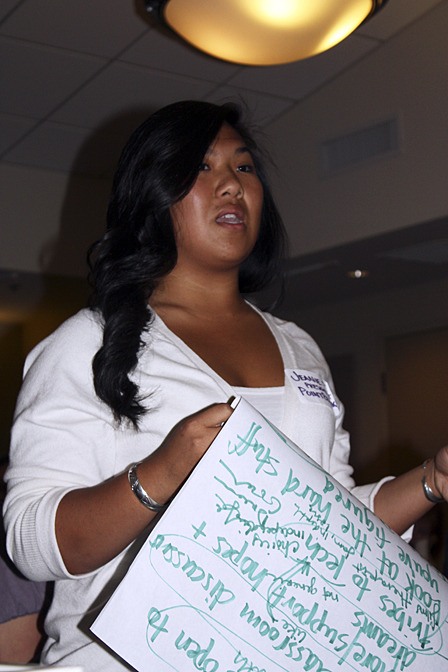According to an old island saw, you can’t kiss a body at one end of Orcas Island without the news traveling to the other end mighty quickly.
At a recent town hall meeting sponsored by the Orcas Island Prevention Partnership, islanders suggested that while the local grapevine can provide accountability for teens and parents, it can also silence dialogue and prevent families struggling with thorny issues from getting help.
“More adults know what’s going on and really care about kids (on Orcas),” said high school senior Jeanie Tran, who is also president of the student leadership group Point Blank.
On the flip side, some said that gossip and mistrust are the main reasons families don’t ask for help.
More than sixty community members and teen advocates met April 21 to discuss underage drinking and teen sexuality. Moderator Diane Berreth said more than 2,000 community town hall meetings will be held across the nation this spring for national Alcohol Awareness Month.
Attendees divided into round table groups and facilitators guided the discussion through questions like, “What community strategies need to be in place to support our youth to make healthy choices about underage drinking?” and “Where and how can we educate youth on Orcas about reproductive health and healthy relationships?”
Attendees said some parents assume kids will use alcohol, and so offer their own homes as a “safe” place for it, perhaps even joining in. Presenters said 90 percent of underage drinkers get their alcohol from others, called “social hosting.” But is underage alcohol use ever safe? Do parents who want a bright future for their kids know what alcohol can do to teen brains? Alcohol use can cause depressed memory and brain activity, chronic sleep deprivation, decreased ability to detect threatening social stimuli and to make judgments, and permanent impairment of brain function, according to presenters.
Other troubling facts: by kids’ own confession, parents tend to greatly underestimate their teens’ drinking – and their lying about it. Parent Amber Paulsen said that when Point Blank student advocates engage in underage drinking, it is “a kick in the gut by the kids doing it half-assed to the ones who are participating wholeheartedly,” causing other island teens to scoff at the entire program.
Peer-to-peer education was discussed as a powerful messaging tool, as well as adult speakers who have suffered devastating effects from alcohol use. And, perhaps surprisingly, student advocate Lindsay Anderson said “It doesn’t feel like there’s (peer) pressure; kids are respectful of choices either way.”
Attendees said adult community members like coaches, parents and youth pastors need to increase their networking and dialogue so they can double-check on teens’ plans and provide positive, alternative recreational options. They also said every school needs a printed “open list” of adults willing to provide non-judgmental, confidential phone support to others.
On the teen sexuality front, participants again raised the issue of education, suggesting more early and consistent sexual education, offered through high school.
Tran said Point Blank has been offering a “healthy relationships” class in the schools in conjunction with DVSAS. Others said parents needed classes on how to talk to their kids about sex. Some expressed the importance of “demystifying desire” and accepting youth’s changing hormones. One table said teens need other outlets for burgeoning sexual energy, like dancing or yoga; others said teens need to know where to find informational resources on other islands. Mention was also made of an Orcas group called the Islands Reproductive Health Initiative, which offers confidential testing and contraceptives to teens.
For more information on the Orcas Island Prevention Partnership, see www.orcasprevention.org
Colleen Smith Armstrong contributed to this story.



